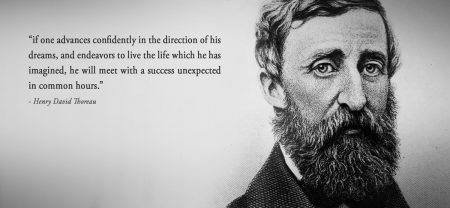
July 12, 1817 – May 6, 1862
About the author:
Henry David Thoreau was born in Concord, Massachusetts in 1817 and lived there for the majority of his life. After attending Harvard University, he was unsure of what he wanted to do with his life. A two week teaching stint and the quick and opening and closing of a school in Concord led Thoreau to the befriending of the great Ralph Waldo Emerson, who immersed Thoreau in the idea of transcendentalism. Due to his great exposure of the healing power of nature from Emerson, Thoreau began his writing of nature poetry in the 1840s. His major beliefs were transcendentalism and civil disobedience, and he was an avid abolitionist especially later in his life. Thoreau’s most recognized accomplishment was his two year stay at Emerson’s Walden Pond where Thoreau built a small home and lived alone with nature. During this widely known time, Thoreau adapted to working one day a week and relaxing and studying nature six days a week, which he deemed the opposite of traditional American life. Achieving modest success during his life, Thoreau was always more concerned with his works and their meaning than having a financial cushion. The great transcendentalist died in 1862 after an almost lifelong battle with tuberculosis. At his funeral, Emerson spoke that “the country knows not yet, or in the least part, how great a son it has lost. His soul was made for the noblest society; he had in a short life exhausted the capabilities of this world; wherever there is knowledge, wherever there is virtue, wherever there is beauty, he will find a home.”
Thoreau was only a guest of New York for a few months during his stay in Staten Island. Looking to experience city life and broaden his literary horizons, Thoreau accepted the job of tutor for Ralph Waldo Emerson’s nephews, which paid well and also allowed him a stay at their family home in Staten Island. During his time here, Thoreau tutored every weekday from 9AM-2PM. Once the tutoring commenced, he would go on daily walks around the property where he enjoyed the flora and fauna that was unknown to the Concord native. Thoreau also especially enjoyed the time he spent by the sea, which revealed the water’s healing nature. When he was not walking through Staten Island, he frequented the city and seemed to hate it more and more with each new visit. Thoreau despised the city to its very core, found no beauty in it – except for that of the crowds of Chatham Street – and wondered why people enjoyed being surrounded by so many other people. After failed attempts at finding both a publisher for his work and enough material to write about, Thoreau moved back to Concord and never returned to New York.
DID YOU KNOW?
A well-known abolitionist, Henry David Thoreau not only wrote on the terrors of slavery but also opened his home in Concord as a safe haven spot on the Underground Railroad for escaped slaves making their way to Canada.
MAJOR WORKS:
- Walden (1854): Arguably Thoreau’s most notorious work, “Walden” was written after Thoreau’s famous two year stay at Walden Pond, on Emerson’s property, living and fully immersing himself in nature every day. Thoreau built himself a home around the pond and worked one day on his writing and focused on nature the other six days. It was during this time that Thoreau truly established his transcendental beliefs and, thankfully for his followers, wrote them down in this masterpiece.

- Civil Disobedience (1849): After being jailed for one night due to failure of payment on a poll tax, Thoreau recognized his almost anarchist ways and wrote them down in this essay that focused on a non-violent approach to the opposition of traditional law and order that Americans blindly follow throughout their lives.
- Other works include:
- “Cape Cod” (1865)
- “Plea for Captain John Brown” (1859)
- “Slavery in Massachusetts” (1854)
- “Dial” Contributions (his first published works, 1843)
READ Letters from Staten Island here!
Critical Analysis of Thoreau’s only New York City work, “Letters from Staten Island”
By Kathryn King
Best known for his work as a transcendentalist, Henry David Thoreau can be recognized as a fish out of water during his stay in New York City. Thoreau’s reading “Letters from Staten Island” is quite comical; he seems to have a true, palpable hatred for the city despite his constant explorations of all that the area offers. Thoreau remarks that “everything disappoints [him] except the crowd” suggesting that the only true positive of New York is the people (67). While Thoreau may suggest that the crowd is the one positive of the city, he contradicts himself many times throughout the reading. Thoreau writes that “it must have been a very bad influence on children to see so many human beings at once” regarding the people of the city as “mere herds of men” (73). This exposes his negative sentiments about the unity of the people of New York, claiming that it is detrimental for the children of the city to be viewing so many people at once. Thoreau also attributes his negative feelings of New York to the fact that he is an outsider. At one point, Thoreau comments that he would “go moping about the fields and woods [there] as [he] did in Concord…and [was] thought to be a surveyor” because no one else seems to hold an appreciation for nature as Thoreau does, therefore he is isolated in that sense (75). In conclusion, Thoreau simply does not fit into the myriad dimensions of the city, so he feels that the unifying factor does not apply to him.
Works Cited:
https://books.google.com/books?id=mQnTQjSS5qEC&pg=PA65&lpg=PA65&dq=letters+from+staten+island+henry+david+thoreau&source=bl&ots=G4rWwofhbH&sig=qcOZPTpkap-iWd5tI1lzNEgYxwU&hl=en&sa=X&ved=0ahUKEwjpyIKSy9HQAhVh0FQKHTg_COQQ6AEIQjAG#v=onepage&q=letters%20from%20staten%20island%20henry%20david%20thoreau&f=false
http://www.biography.com/people/henry-david-thoreau-9506784
http://george.loper.org/interests/housing/thero/thoreau.html